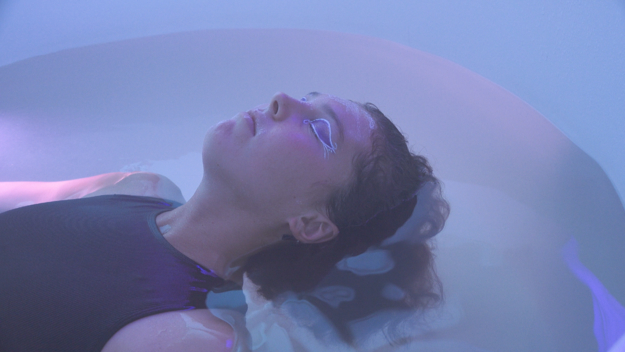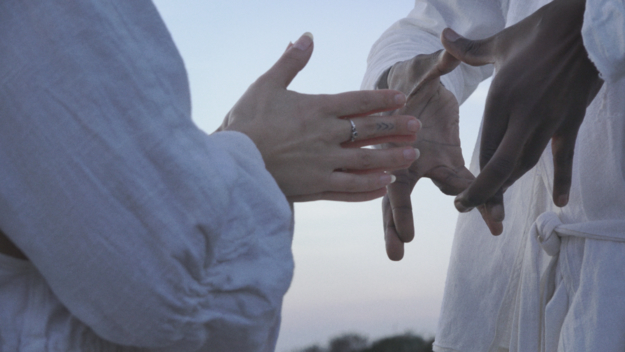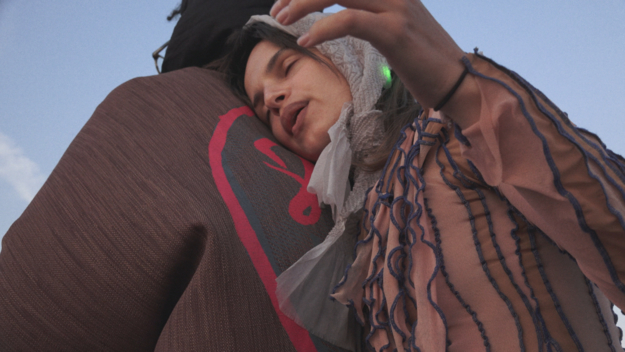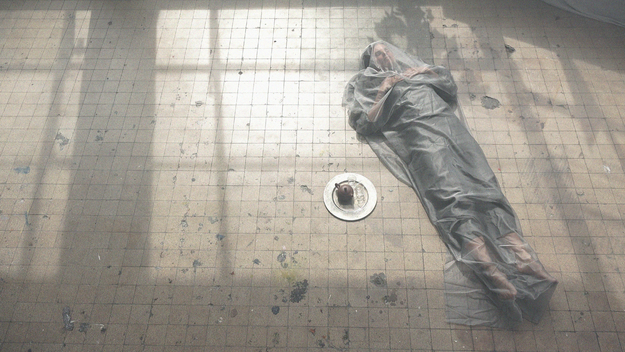Entangled Collaboration
Liminal Vision is at heart a collaborative project, in which the two artists have found a productive symbiosis. When we asked them to describe their respective roles in the collaboration, it became apparent that there is no straightforward answer. Emilia told us that Victor acts as a creative director, making sure the thematic integrity and atmosphere of the project is preserved at different decision points. Victor added that in early development stages of concepting a spectulative world, he creates mood boards consisting of photos and drawings to get a grasp of the atmosphere of the world, according to which Emilia then selects her camera filters. Emilia also told us that many of the ideas for the worlds stem from the unique connections Victor draws between different concepts. The directing and film making is Emilia’s job, while Victor sometimes creates the music to go with the images, and even features as an actor in the films sometimes.
Zhouwei Network - three ambitopian societies
During their presentation, Victor and Emilia focused on their world building project, Zhouwei Network, which they recently developed 35-minute documentary film.
This project explores three different future societies which coexist on Earth in 2041, one in the Dutch Randstad, one in New York city and one in various locations across the planet. Victor and Emilia took us through all three of them, explaining their conceptual backgrounds and showing the mood boards Victor created as inspiration and guidance, as well as excerpts from the actual film.
The artists explained how each of the three societies they envision is ambitopian: not quite utopia, not quite dystopia, but containing elements of both. Dance, movement and meditation are a red thread connecting the three worlds.
I will briefly describe each one, although it is difficult to capture the immersive atmosphere created by the actual film, which hasn't been published yet, but has been screened online and on media art exhibitions since 2021.
The first of the three societies we visited is named Dragonfly, and portrays a technocratic state focused on safety and harmony in the Netherlands that has emerged through an intense period of socio-poltical and environmental crises. We see a clip from the film, during which a young woman is guided through a yoga-like meditation by an AI teacher in an otherwise empty room.
The next society we discussed is called Dolphin Waves, set in New York, which has evolved into a system of ludic surveillance capitalism. Instead of work, the system is based on wellness and play, but nevertheless centred around profit. We see a young woman enter into a wellness tank, where a disembodied voice tells her a story about the trickster god Loki, who transformed into a salmon just to invent the fishing net. The idea behind this world is to imagine yourself as different beings and to playfully engage with your own body and consciousness to see what it can expand into.
Still image - Dolphin Waves from Zhouwei Network documentary -

The last society, named Project Gecko, ties the three worlds together, as it is set in various locations across the globe. Project Gecko is a network of decentralised liquid democracies which can be joined through invitation only. It is focused on inner healing through movement, and to join, you have to create your own “movement password“ through dance. We watch a clip from the film which shows a woman being guided through this process.
Still image - Project Gecko from Zhouwei Network documentary -

During their explanations, the artists stressed that traces of these different societies already exist inside our own society today. “Sometimes we read something on the news and think wow, this is so Project Gecko, or this is so Dolphin Waves“. These observations apply as much to new technological innovations as they do to subtle atmospheric undertones.
Below you can see a short trailer for the film. For more information about the work and a screener link to the documentary, get in touch with Liminal Vision via: contact@liminal.vision
Trailer for the documentary about the speculative world of Zhouwei Network.
The role of autism in the creative process
After the presentation, another artist asked about Victor’s perspective on the influence of his autism on this work. In his answer, it became clear quickly that his autism is at the very core of his motivation to imagine and plan out different worlds. “When you are autistic, things are never as intuitively obvious to you as they are to other people“, he said. “There is always the question of why things are like this in society, why should I do things this way?“ He jumps into a musical analogy: Neurotypical people dance with the system intuitively, but when autistic people try to do this, they step on its toes. This causes him to ask what the system requires from you in order for you to be able to dance within it. What if you hear a different rhythm in your ear that you would rather dance to? How could you make that other rhythm audible and help other people to also start hearing and imagining different kinds of systems? These are some of the questions he asks himself, initiated by his own perspective of which his autism is an integral part.
He added that while we perceive our societal and cultural systems as the reality, they are in fact also just a fantasy, something that we made up and are upholding collectively and unconsciously. His autism helps him to question this fantasy and to imagine other possibilities. Sometimes the made up worlds make more sense to him than the “real“.
Emilia added to this that Victor’s unique autistic vision of the world enables him to draw very unlikely connections in a sort of big mind-mapping practice, connecting concepts that seem very far from each other to create highly original visions for their projects.
How can we support autistic makers?
However, there are also downsides. Due to his special needs, Victor is under a conservatorship, which means that often times it is unclear whether he can qualify for funding for the projects he and Emilia create together. This makes it difficult for him to receive the correct credit for their highly collaborative work, which can be unfair and frustrating. Often, only Emilia’s name is mentioned and she has to constantly stress that the work is not only hers, but Victor’s as well.
Knowing these struggles well, she asked how Mediamatic will concretely approach funding and supporting autistic makers and artists in our programme. This is an ongoing and very important conversation at Mediamatic, which was already brought up during our first discussion round of the year. While we did not have enough time to go into depth on how institutions like Mediamatic can best support autistic makers, it is a question that deserves a lot more attention, so one of our upcoming discussion rounds will also be dedicated to this topic.

